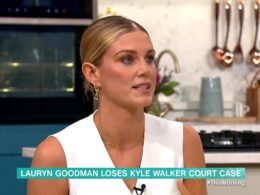The Department of Veteran Affairs (VA) has demanded more than 120,000 disabled vets pay back lump-sum special separation payments paid out over the past 12 years, a new report has revealed.
The requests, issued from 2013 until now, stem from a law designed to prevent vets from receiving both disability and special separation pay.
The latter is a lump sum paid out to service members as an incentive to leave, as a method to clear up space when branches restructure.
Oversights occur when vets file and receive disability afterwards, leaving the VA to catch up.
Something known as ‘recoupment’ is the result, where the government claws back the payments sometimes years later. This has thrust some into hardship, as vets at times have to pay back tens of thousands of dollars.

The Department of Veteran Affairs (VA) has demanded more than 120,000 disabled vets pay back lump-sum special separation payments paid out over the past 12 years, a new report from NBC News has revealed
‘That’s wrong,’ said Vernon Reffitt, 62, told NBC News – the outlet to first report on the outsized amount of recruitments – last month of the little-known practice.
‘You can’t just up and take it back.’
Reffitt, who resides in Georgia, is one of four former servicemembers speaking up about the controversy in statements to the media.
He’s on the hook for $30,000 – a sum provided to him by the US Army way back in 1992.
In May, the VA realized its mistake, and began rectifying it by withholding his monthly disability compensation.
In a statement to NBC, the agency reportedly said it was ‘unaware of the amount’ of Reffitt’s special separation package when he began receiving disability compensation later that year.
Reffitt served in Panama and Honduras and did two tours in Germany during his tenure as a military policeman from 1979 to 1992.
Another disabled Army vet, 36-year-old Daphne Young, is in a similar position, after accepting a $15,000 lump sump when she left the branch in 2016.

Vernon Reffitt, now 62, is on the hook for $30,000 – a sum provided to him by the US Army way back in 1992. He is seen here during his tenure as a military policeman circa 1980

Another disabled Army vet, 36-year-old Daphne Young, is in a similar position, after accepting a $15,000 lump sump upon leaving the military branch in 2016
In April, nearly a decade later, she was told she would have to pay the entire amount back if she wanted to continue receiving her untaxed disability payment of around $3,700.
‘It was agonizing,’ recalled Young, a former Army ammunition specialist and combat medic who became fully disabled after being deployed to Iraq and Afghanistan, of receiving the letter.
Shane Collins, 41, added how it took him the better part of three years to repay the roughly $33,000 he was offered in 2014 to leave the Marines, telling the outlet: ‘It took the legs from right underneath me.
The Idaho dad, who also worked at the Pentagon, added how even he never knew he would have to repay his separation if given disability, despite his familiarity with different facets of government
‘I thought they were completely separate,’ he said last month. ‘And that’s how it was explained to me as well.’
Such was the case for 55-year-old Shawn Teller, who began receiving monthly disability for an old knee injury in 2012.
That was after he already accepted a one-time payment of around $10,700 to leave the Army in 1996, after serving for about eight years, in operations like Desert Storm and Desert Shield.

‘It was agonizing,’ said Young, a former Army ammunition specialist and combat medic who became fully disabled after being deployed to both Iraq and Afghanistan
‘It was something somebody overlooked at the time, and then they caught it now,’ the California resident told NBC News after being told in July that the VA would start withholding his monthly $586 disability check until he repays.
‘I rely on this pay every month,’ he said. ‘It’s not right.’
Two years before, Stephanie Rennane of the RAND Corporation, a nonprofit research group, found that at least 79,000 veterans had to repay different types of separation benefits between the years of 2013 and 2020.
Speaking to NBC News last month, she said: ‘I think it’s likely that we’re missing a good number of people.
‘We don’t have any way of knowing how big it is.’
On Saturday, the news station appeared to confirm these fears when it put forth a new report based on reported VA data that put the true number – from 2013 to today – around 122,000.
The outlet added that it had spoken to several veterans whose debt now totals in the tens of thousands of dollars.
One reportedly complained that it would take him nearly 15 years to pay back what he owes, as another said he had been forced to cut out all expenses not deemed a necessity – and consider taking on a second job – to address the unseen expense.

The sign of the Department of Veteran Affairs is seen in front of the headquarters building in Washington
The outlet also offered a breakdown of the number of recoupments, beginning with the the earliest year available, fiscal year 2013.
Back then, the VA reportedly took back separation pay from about 6,700 veterans, followed by a further 7,500 in 2014.
From 2015 to 2017, the agency requested lump sums back from about 12,000 receiving disability each year, before it rocketed to 17,000 in fiscal year 2018.
The amount went on to diminish back down to less then 10,000 the next year, before lowering again to around 8,130 veterans in fiscal year 2020 and 8,550 in 2021, NBC News reported.
The number of recoupments dropped again in 2022, to around 7,940, to nearly 10,000 in 2023.
As for this year, going up to the end of June, the VA reportedly initiated recoupments for another 8,920.
The dips and rises come amid a rise in disability claims over the years, with some 2.3 million compensation claim applications being recorded this past year.
That’s a 42 increase from 2022.

The recoupments come amid a rise in disability claims over the years, with some 2.3 million compensation claim applications being recorded this past year. Citing these numbers, VA Press Secretary Terrence Hayes said, ‘There is no concerted effort to increase recoupment’
Citing these numbers, VA Press Secretary Terrence Hayes told NBC News Saturday, ‘There is no concerted effort to increase recoupment.
‘Instead, it is a part of the normal, legally required process during completion of the initial claim application which asks claimants if they received a separation bonus and the amount received,’ he said.
DailyMail.com has reached out to the VA for comment.







